- Clone
- S16013D (See other available formats)
- Regulatory Status
- RUO
- Other Names
- CD289, TLR9, Toll-like receptor 9
- Isotype
- Rat IgG2a, κ
- Ave. Rating
- Submit a Review
- Product Citations
- publications
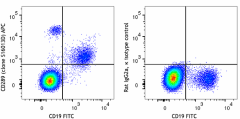
-

Human peripheral blood mononuclear cells were stained with CD304 Brilliant Violet 421™ and CD19 FITC, fixed, permeabilized, and then intracellularly stained with CD289 (clone S16013D) APC (left) or Rat IgG2a, κ APC isotype control (right). Dot plots exclude monocytes. -

Human peripheral blood mononuclear cells were stained with CD304 Brilliant Violet 421™ and CD19 FITC, fixed, permeabilized, and then intracellularly stained with CD289 (clone S16013D) APC (left) or Rat IgG2a, κ APC isotype control (right). Dot plots exclude monocytes. -

Human peripheral blood was stained with CD304 Brilliant Violet 421™, CD19 FITC, and CD289 (clone S16013D) APC (left) or Rat IgG2a, κ APC isotype control (right). Dot plots exclude monocytes and granulocytes.
| Cat # | Size | Price | Quantity Check Availability | Save | ||
|---|---|---|---|---|---|---|
| 394807 | 25 tests | £122 | ||||
| 394808 | 100 tests | £280 | ||||
TLR9 is a member of the toll-like receptor family that aids in recognition of pathogen associated molecular patterns (PAMPs). TLR9 recognizes unmethylated CpG sequences in DNA (ie. intracellular bacteria and DNA viruses). TLR9 signals through the MyD88 pathway leading to inflammatory cytokine production, especially production of type I interferons by pDCs.
Product DetailsProduct Details
- Verified Reactivity
- Human
- Antibody Type
- Monoclonal
- Host Species
- Rat
- Immunogen
- CD289 (TLR9)
- Formulation
- Phosphate-buffered solution, pH 7.2, containing 0.09% sodium azide and BSA (origin USA)
- Preparation
- The antibody was purified by affinity chromatography and conjugated with APC under optimal conditions.
- Concentration
- Lot-specific (to obtain lot-specific concentration and expiration, please enter the lot number in our Certificate of Analysis online tool.)
- Storage & Handling
- The antibody solution should be stored undiluted between 2°C and 8°C, and protected from prolonged exposure to light. Do not freeze.
- Application
-
ICFC, FC - Quality tested
- Recommended Usage
-
Each lot of this antibody is quality control tested by intracellular immunofluorescent staining with flow cytometric analysis. For flow cytometric staining, the suggested use of this reagent is 5 µl per million cells in 100 µl staining volume or 5 µl per 100 µl of whole blood. Each lot of this antibody is quality control tested by immunofluorescent staining with flow cytometric analysis. For flow cytometric staining, the suggested use of this reagent is 5 µl per million cells in 100 µl staining volume or 5 µl per 100 µl of whole blood.
- Excitation Laser
-
Red Laser (633 nm)
- Application Notes
-
S16013D clone can be used for both surface and intracellular detection of TLR9. ICFC compatible with both the intracellular flow cytometric staining and True-Nuclear™ transcription buffer set. Does not work for WB (tested on Daudi cell line).
- RRID
-
AB_2801041 (BioLegend Cat. No. 394807)
AB_2801041 (BioLegend Cat. No. 394808)
Antigen Details
- Distribution
-
TLR9 is expressed by B cells and plasmacytoid dendritic cells (pDC).
- Ligand/Receptor
- TLR9 recognizes unmethylated CpG sequences in DNA.
- Cell Type
- B cells, Dendritic cells
- Biology Area
- Bacterial proteins and Toxins, Immuno-Oncology, Immunology, Innate Immunity
- Molecular Family
- CD Molecules, Innate Immune Signaling, Toll Like Receptors
- Antigen References
-
- Hornung V, et al. 2002. J. Immunol. 168:4531.
- Eaton-Bassiri A, et al. 2004. Infect. Immun. 72:7202.
- Krieg, A. 2007. J. Clin. Invest. 117:1184.
- Gene ID
- 54106 View all products for this Gene ID
- UniProt
- View information about CD289 on UniProt.org
Related FAQs
Other Formats
View All CD289 Reagents Request Custom Conjugation| Description | Clone | Applications |
|---|---|---|
| Purified anti-human CD289 (TLR9) | S16013D | ICFC,FC |
| PE anti-human CD289 (TLR9) | S16013D | ICFC,FC |
| Brilliant Violet 421™ anti-human CD289 (TLR9) | S16013D | ICFC,FC |
| APC anti-human CD289 (TLR9) | S16013D | ICFC,FC |
| FITC anti-human CD289 (TLR9) | S16013D | ICFC |
| APC/Fire™ 810 anti-human CD289 (TLR9) | S16013D | ICFC |
Customers Also Purchased
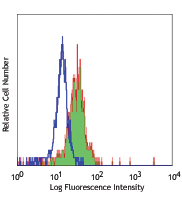
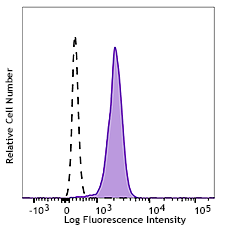
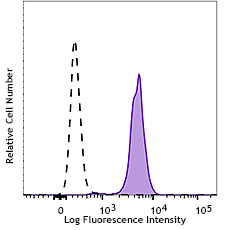
Compare Data Across All Formats
This data display is provided for general comparisons between formats.
Your actual data may vary due to variations in samples, target cells, instruments and their settings, staining conditions, and other factors.
If you need assistance with selecting the best format contact our expert technical support team.
-
Purified anti-human CD289 (TLR9)

Human peripheral blood mononuclear cells were stained with C... 
Human peripheral blood mononuclear cells were stained with C... 
Human peripheral blood was stained with CD304 Alexa Fluor® 6... -
PE anti-human CD289 (TLR9)

Human peripheral blood mononuclear cells were stained with C... 
Human peripheral blood mononuclear cells were stained with C... 
Human peripheral blood was stained with CD304 Alexa Fluor® 6... -
Brilliant Violet 421™ anti-human CD289 (TLR9)

Human peripheral blood mononuclear cells were stained with C... 
Human peripheral blood mononuclear cells were stained with C... 
Human peripheral blood was stained with CD304 APC, CD19 FITC... -
APC anti-human CD289 (TLR9)

Human peripheral blood mononuclear cells were stained with C... 
Human peripheral blood mononuclear cells were stained with C... 
Human peripheral blood was stained with CD304 Brilliant Viol... -
FITC anti-human CD289 (TLR9)

Human peripheral blood mononuclear cells were stained with C... -
APC/Fire™ 810 anti-human CD289 (TLR9)

Human peripheral blood lymphocyte cells were stained with an... 
Human peripheral blood mononuclear cells were stained with a... 
Human peripheral blood lymphocytes were stained with anti-hu...

 Login / Register
Login / Register 










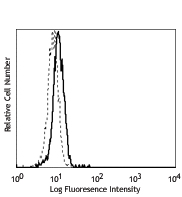



Follow Us